FIVE BRAND NEW BOOKS THAT YOU MUST KNOW ABOUT – 20% OFF. Order Below.
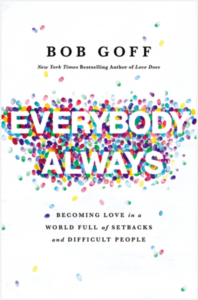 Everybody Always: Becoming Love in a World Setbacks and Difficulty People Bob Goff (Nelson) $16.99 I can’t wait to read this brand new release by one of my favorite people and one of heckuva fun writer. Goff is a great storyteller and, man, does he have a lot to talk about – his work fighting international slavery, reforming laws in Uganda or his well known efforts forming schools (even in war zones in Somalia and Iraq) make for great testimony. So this is going to be great. He is a lawyer, motivational guy, and great dad and husband and friend to people all over the world. Did I mention the Somalia and Iraq thing? He’s full of good humor and seems to be fearless. The book is going to be great.
Everybody Always: Becoming Love in a World Setbacks and Difficulty People Bob Goff (Nelson) $16.99 I can’t wait to read this brand new release by one of my favorite people and one of heckuva fun writer. Goff is a great storyteller and, man, does he have a lot to talk about – his work fighting international slavery, reforming laws in Uganda or his well known efforts forming schools (even in war zones in Somalia and Iraq) make for great testimony. So this is going to be great. He is a lawyer, motivational guy, and great dad and husband and friend to people all over the world. Did I mention the Somalia and Iraq thing? He’s full of good humor and seems to be fearless. The book is going to be great.

Those that know his hilariously moving Love Does: Discover a Secretly Incredible Life in an Ordinary World (Thomas Nelson; $16.99) knows of the capers Goff gets himself into and the clever, inviting way he uses his world-class escapades as ways to help inspire us all to love others well, to do good stuff, to be involved in God’s work in the world and to be all in. Never have I heard the phrase “skin in the game” so well used.
 If you haven’t read his first collection of wild pieces, or the very good book by his wife and partner Sweet Maria, by the way, called Love Lives Here: Finding What You Need in a World Telling You What You Want (B+H; $17.99) you certainly should and I’m confident that you’ll enjoy them and will be pressing them into the hands of anybody you know who likes to read. The word of mouth buzz on Love Does has been one of the coolest things we’ve seen in our years of bookselling; everywhere we go people know this book. (And, happily, Love Does and Love Lives Here are the sort of books that can hook even though who don’t typically read much.) I also recommend his Love Does DVD curriculum ($29.99) which is a fun five-week course with Bob doing his Bob thing, leaking Jesus over everybody and somehow both reassuring and challenging and equipping us.
If you haven’t read his first collection of wild pieces, or the very good book by his wife and partner Sweet Maria, by the way, called Love Lives Here: Finding What You Need in a World Telling You What You Want (B+H; $17.99) you certainly should and I’m confident that you’ll enjoy them and will be pressing them into the hands of anybody you know who likes to read. The word of mouth buzz on Love Does has been one of the coolest things we’ve seen in our years of bookselling; everywhere we go people know this book. (And, happily, Love Does and Love Lives Here are the sort of books that can hook even though who don’t typically read much.) I also recommend his Love Does DVD curriculum ($29.99) which is a fun five-week course with Bob doing his Bob thing, leaking Jesus over everybody and somehow both reassuring and challenging and equipping us.
I have only read a small bit of Everybody Always and I can say I am sure it is an entertaining and important as Love Does. I know I need it. How ‘bout you? Isn’t the question intriguing: what happens when we give away love like we’re made of it?
Goff is a witty wordsmith, and it shows up even in his little epigram in the front – we are rivers, not reservoirs, he says. We don’t have to store up our love, but can give it away.
The preface, again, is stunning, so clever and so right on. We’ve been waiting for this book for a while and are delighted to hear which stories strike you best. “Whether losing his shoes while skydiving solo or befriending a Uganda witch doctor,” it says on the back, “Bob steps into life with a no-limits embrace of others that is as infectious as it is extraordinarily ordinary. Everybody, Always reveals how we can do the same.”
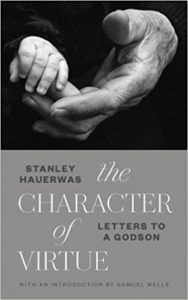 The Character of Virtue: Letters to a Godson Stanley Hauerwas (Eerdmans) $21.00 There are many who know that Dr. Hauerwas, Professor Emeritus of Divinity and Law at Duke University, is one of the most important living theologians today, a deep philosopher, a colorful speaker, and a vibrant and robust proponent of character formation by submitting to Christian practices within the church. That is, the church shapes and forms us to be God’s people in the world that, if we are following Jesus, at least, is going to be controversial and counter-cultural. He has written bunches of books, some quite scholarly, and is known all over the globe.
The Character of Virtue: Letters to a Godson Stanley Hauerwas (Eerdmans) $21.00 There are many who know that Dr. Hauerwas, Professor Emeritus of Divinity and Law at Duke University, is one of the most important living theologians today, a deep philosopher, a colorful speaker, and a vibrant and robust proponent of character formation by submitting to Christian practices within the church. That is, the church shapes and forms us to be God’s people in the world that, if we are following Jesus, at least, is going to be controversial and counter-cultural. He has written bunches of books, some quite scholarly, and is known all over the globe.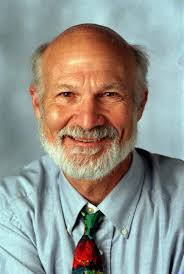
United Methodist gentleman and scholar Will Willimon has written with Hauerwas a lot – softening his edge only just a little – and, within another theological stream, James K.A. Smith has interacted with his work a wisely, even in his most recent volume, Waiting for the King. My friend Steve Garber’s first book, Fabric of Faithfulness: Weaving Together Belief and Behavior, spends considerable time engaging Hauerwas’s A Community of Character. Hauerwas even wrote a truly lovely book with Jean Vanier called Living Gently in a Violent World: The Prophetic Witness of Weakness. Stanley, whose father was a bricklayer (his memoir is called Hannah’s Child) has significant interest in a theology of disability and his work with Vanier (who shares life with those with intellectual handicaps) makes sense. Despite his vast intellect and his reputation for passionate teaching and preaching, he is down to Earth and in many ways a plainspoken, wise elder who has himself found solidarity with the suffering.
And so, this book will have wide appeal, certainly for anyone who appreciates Hauerwas or who have wondered about him but didn’t know what book to read first. (This is it!) Further, it will be appealing for anyone who wants to see how a set of letters describing different virtues can inspire even young people. It certainly will be a great book for an older teen, perhaps a thoughtful high school graduate?
The letters that became the handsome hardback book The Character of Virtue started when Hauerwas wrote a thoughtful letter upon the infant baptism of his godchild, Laurence Wells (son of famous Anglican leader Sam Wells and Jo, his theologian wife and former Duke faculty member.)
Hauerwas, who admits that his own life may not be as virtuous as the letters he writes about the virtues, does a beautiful job writing a letter to Laurie once a year for sixteen years. In each letter he explains a bit about their life – they are personal letters, after all, to a real child and family friend – but mostly expounds on the particular virtue he is helping young Laurie to understand and embrace.
As you may guess, these are not childish letters and the young godson surely wouldn’t have understood them until years later. He does talk about pets and games (and politics) but, again, they are mature ruminations that I am sure the lad Laurie did not read until much later in life. But for us, older or younger adults reading over their shoulders, it is simply spectacular. What a set of epistles! It is, as Lauren Winner has said, “a distillation of Stanley Hauerwas’s thought and a distillation of love.”
James Martin, SJ
— editor of America magazine
“Bound to become a classic, Stanley Hauerwas’s wise, gentle, and compassionate letters to his godson are, in fact, timeless teachings from a great spiritual master to all of us.”
N. T. Wright
— University of St. Andrews
“Seeing Stanley Hauerwas’s treatment of the virtues through the eyes of Sam Wells’s growing son, reflecting one minute on vast reaches of truth and the next on close-up political and personal challenges, all with a light touch and characteristic Texan grit–this is a treat. A book to read and savor.”
James K. A. Smith
— author of You Are What You Love and How (Not) to Be Secular
“Hauerwas’s marvelous letters in The Character of Virtue are not only wisdom for those growing in the faith; they are also a model for how all of us can come alongside parents in the hard good work of raising children in the faith.”
Lauren F. Winner
— author of Mudhouse Sabbath and Wearing God
“A distillation of Stanley Hauerwas’s thought, and a distillation of love–these letters should find a home on your bookcase. But make sure that it is easily accessed, as you’ll want to take The Character of Virtue down often, flip it open to any page, and immerse yourself in its loving, bracing wisdom.”
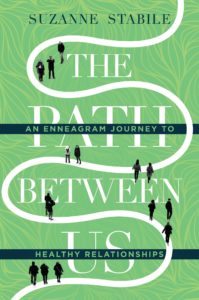 The Path Between Us: An Enneagram Journey to Healthy Relationships Suzanne Stabile (IVP) $24.00 and The Path Between Us Study Guide (IVP; $9.00)There are a lot of diagnostic tools to help us understand ourselves and others, from Meyers-Briggs to Love Languages and more. Learning about the nine Enneagram types has been incredibly popular this last year or two with several good books recently released. Customer keep telling us how much these books mean to them and how they’ve enjoyed these insights. Among our favs of recent titles include The Sacred Enneagram: Finding Your Unique Path to Spiritual Growth by Christopher Heuertz (Zondervan; $18.99) and Mirror for the Soul: A Christian Guide to the Enneagram by Alice Fryling (IVP; $16.00.) But Suzanne Stabile’s first major book, co-authored by the always great and so interesting Episcopal priest Ian Cron, The Road Back to You: An Enneagram Journey to Self-Discovery (IVP; $24.00) has been by far the biggest seller and most discussed Enneagram book in years. This is, in part, I think, because it is so lively and fun and also because Stabile and Cron have had tremendously popular podcasts. It’s a great book.
The Path Between Us: An Enneagram Journey to Healthy Relationships Suzanne Stabile (IVP) $24.00 and The Path Between Us Study Guide (IVP; $9.00)There are a lot of diagnostic tools to help us understand ourselves and others, from Meyers-Briggs to Love Languages and more. Learning about the nine Enneagram types has been incredibly popular this last year or two with several good books recently released. Customer keep telling us how much these books mean to them and how they’ve enjoyed these insights. Among our favs of recent titles include The Sacred Enneagram: Finding Your Unique Path to Spiritual Growth by Christopher Heuertz (Zondervan; $18.99) and Mirror for the Soul: A Christian Guide to the Enneagram by Alice Fryling (IVP; $16.00.) But Suzanne Stabile’s first major book, co-authored by the always great and so interesting Episcopal priest Ian Cron, The Road Back to You: An Enneagram Journey to Self-Discovery (IVP; $24.00) has been by far the biggest seller and most discussed Enneagram book in years. This is, in part, I think, because it is so lively and fun and also because Stabile and Cron have had tremendously popular podcasts. It’s a great book.
The Path Between Us is a new sequel to The Road Back to You but can be read without having read the first one (especially if you already know something about the Enneagram types.) It really is about how we see ourselves, how we see others, and, most importantly, how the nine “types” see and experience relationships. Oh my. That is, in a manner similar to (but more nuanced and deeper than) the “love languages” project, it is inviting us to deeper, better, relationships and to be more gracious in understanding how others work. Stabile is known as a master teacher, a great communicator, and has been doing workshops on this for years – she’s a gifted storyteller and many have proclaimed she’s the best at this stuff, anywhere. Lutheran pastor Nadia Bolz-Weber, for instance, says, “She is without question the best Enneagram teacher out there.” Another author says of The Path Between Us “you will reference it for years to come.”
Richard Rohr, who has himself written a massive book on the topic, says:
Few people can teach you the Enneagram with the genuine insight, humor, and potential for real growth and change better than Suzanne Stabile! Savor every page. You, your friends and family, and the universe will all benefit!
I have said this with the first book, The Path Between Us and I will say it again here: although I often don’t try to push “study guides” and “workbooks” I do think in this case the workbook is very, very useful as a tool to process this information. This is the kind of content that has to be worked with a bit and the study booklet they’ve created is very highly recommended.
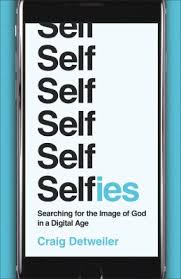 Selfies: Searching for the Image of God in a Digital Age Craig Detweiler (Brazos Press) $19.99 I love the writing and work of Craig Detweiler who has been one of the leading voices offering a thoughtful evangelical voice in the studies of popular culture, the modern zeitgeist, and faithful ways to navigate the world of entertainment, digital culture, video games, movies, and such. We take his book iGods: How Technology Shapes Our Spiritual and Social Lives almost everywhere we go, hoping that it will inspire folks to attend more deeply about the very water we swim in, to discern a bit about the times, being better equipped to follow Jesus’ command to be “in but not of” the world. Detweiler does his good work, linking theology and Christian perspectives with social and cultural and historical analysis, so I trust him a lot. I was delighted to learn that he just recently took a new position as the president of The Seattle School of Theology & Psychology, a graduate school founded by our friend Dan Allender. What a good gift he will be to them.
Selfies: Searching for the Image of God in a Digital Age Craig Detweiler (Brazos Press) $19.99 I love the writing and work of Craig Detweiler who has been one of the leading voices offering a thoughtful evangelical voice in the studies of popular culture, the modern zeitgeist, and faithful ways to navigate the world of entertainment, digital culture, video games, movies, and such. We take his book iGods: How Technology Shapes Our Spiritual and Social Lives almost everywhere we go, hoping that it will inspire folks to attend more deeply about the very water we swim in, to discern a bit about the times, being better equipped to follow Jesus’ command to be “in but not of” the world. Detweiler does his good work, linking theology and Christian perspectives with social and cultural and historical analysis, so I trust him a lot. I was delighted to learn that he just recently took a new position as the president of The Seattle School of Theology & Psychology, a graduate school founded by our friend Dan Allender. What a good gift he will be to them.
This brand new one is extraordinary and I can’t wait to read it. If you have any sort of open-minded reading group that studies good non-fiction, I’m sure this would make a good selection to ponder and discuss. His main point, I gather, is that what seems like a culture of narcissism – the incessant taking of pictures of oneself – may be a signal of transcendence, some kind of hint about our significance as people made in the image of God. By tracing the history of things like self portraits in the art world he Detweiler shows deftly that this isn’t a new thing after all.
We have often said that the most important book (ever) on the topic of the image of God is Richard Middleton’s magisterial The Liberating Image: The Imago Dei in Genesis 1and as potent as it is, it is, obviously, a book of Biblical research. Richard’s occasional co-author Brian Walsh has a extraordinary collection of talks and sermons that powerfully draw on the themes of what it means to image God, especially in socio-political regimes of secularization, idols and oppression (such as our own?) called Subversive Christianity: Imaging God in a Dangerous Time. These are among books I return to often, to dip in and ponder and that I use in my own teaching and talks.
Craig Detweiler moves in a somewhat different direction in that this is less about what it means to image God in contrast to the false gods of the dominant culture of economic idolatry, say, but more about how through what we might call common grace we can find overlaps and great joys in the search for meaning in our selfie age. Middleton primarily gives us the Biblical content and Walsh powerfully critiques the time that it is in late Western capitalism and their work with the imago dei is brilliant. Another one of my favorite books on the nature of the modern self is the tremendous sleeper (that is, it is not terribly well known) by Mark Sayers called The Vertical Self and it certainly exposes our “self obsession.” Detweiler is paying attention to the recent development of digital culture, of the experience economy, of how we are navigating this cultural moment psychologically and spiritually. Sure he looks at the over-emphasis of some things – Daniel White Hodge calls it in his blurb a look at “the good, the bad, and the very ugly” – but it isn’t mostly a critique. It is a love-song to our current age, an invitation, a re-framing by looking at history and how others have viewed the self, showing what might really be going on. He is asking how we do that — think about the self, our inherent dignity, framing our self-understanding in light of the history of this sort of thing — in these days given our instant culture of selfies. Is there a continuity between Augustine’s memoirs and Rembrandt’s portraits and Kim Kardashian’s twitter feed?
Can we learn something about human happiness by reflection on Greco-Roman art or the early church fathers or, say, by reflecting on the rise of modern photography (perhaps through the lens of Susan Sontag’s famous On Photography?)
This is fabulous stuff, brilliant, I’d say, with a extraordinarily rich set of footnotes and citations — wow. Detweiler is bringing a wonderfully learned, historical approach but also, it seems, a sweet sensibility, looking for the good, despite the “culture of narcissism,” helping us even delight in some of what is happening these recent days.
Here is the table of contents:
1. Introduction: How Do You Solve a Problem Like the Selfie?
2. Reflected Beauty: The Ancient Self
3. Mastering the Mirror: A Renaissance of the Self
4. Reframing Memories: The Literary Self
5. Seizing the Light: Photographing Ourselves
6. Behind the Mask: The Psychological Self
7. Instapressure: The Selfie Today
8. Augmented and Transfigured: The Self
As you can see from these rave endorsements, which I just had to copy, below, Selfies is a book rich in church history, in art history, in the contours of the rise psychology and technology and draws on great insights from inter-disciplinary cultural studies. And it yet is readable – it even has discussion questions, hinting that it could be used for book clubs or Sunday school classes. We highly recommended it to thoughtful readers Check out these reviews:
Selfies helps us journey beyond our narcissistic culture, giving us language to move away from an ego-filled self-expression to our true identities hidden in Christ. Reflecting Detweiler’s impressive grasp of art history and deep wisdom attained in media ecology, Selfies is both an invaluable guide for understanding our techno world with all its trappings and a book full of delightful observations. — Makoto Fujimura, Brehm Center for Worship, Theology, and the Arts, Fuller Theological Seminary
I don’t know anyone who can connect the dots between centuries of church history and twenty-first-century selfies like Detweiler. This book has changed the way I think about the images I see and share as well as the image of God in all of us. — Kara Powell, Fuller Youth Institute; coauthor of Growing Young
Detweiler takes us on a fabulous journey through history in search of the first selfie. Stories of Narcissus, Rembrandt, Bayard, and Kim Kardashian provide a fascinating backdrop for understanding why it feels so good to get the perfect shot of me. — Peggy Kendall, Bethel University; author of Reboot: Refreshing Your Faith in a High-Tech World
A Rosetta stone for people of faith bewildered by the seeming narcissism of the ubiquitous selfie. Detweiler taps the collective wisdom found in Greek mythology, art history, psychoanalysis, and media criticism to help translate biblical principles to this troubling use of technology. Selfies encourages readers to view the images of others and ourselves with compassion and curiosity and to see past the image to the collective longing to be known. — Lisa Swain, Biola University
This brilliant book does not simply bash media but critically explores it while presenting the good, the bad, and the very ugly. A must-read for anyone who spends even a minute on the internet or near any media outlet. — Daniel White Hodge, North Park University; author of Homeland Insecurity: A Hip-Hop Missiology for the Post-Civil Rights Context
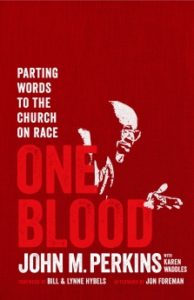 One Blood: Parting Words to the Church on Race John M. Perkins (Moody Press) $15.99 This is a handsome linen hardback, sans dust jacket, with nice red endpapers and it seems to have some gravitas to it. It is said that this is Dr. Perkins’s last book. I don’t know about that but I am sure that any time this African American leader writes something, many people should buy it, pass it around, share his work widely, and make your friends and churches know how important it is. If this is aid to be his “parting words” you should pay attention. There is a lot packed in here and he speaks plainly. In fact, he asks for our willingness to listen since he is an elder and doesn’t have time to mince words.
One Blood: Parting Words to the Church on Race John M. Perkins (Moody Press) $15.99 This is a handsome linen hardback, sans dust jacket, with nice red endpapers and it seems to have some gravitas to it. It is said that this is Dr. Perkins’s last book. I don’t know about that but I am sure that any time this African American leader writes something, many people should buy it, pass it around, share his work widely, and make your friends and churches know how important it is. If this is aid to be his “parting words” you should pay attention. There is a lot packed in here and he speaks plainly. In fact, he asks for our willingness to listen since he is an elder and doesn’t have time to mince words.
Dr. John Perkins has been an evangelical voice of black leadership development and service to the poor and civil rights and racial reconciliation for decades and, now in his late 80s (he as born in the 1930s to a sharecropping family in rural Mississippi) he wants to share thoughts about his many years doing God’s work. He has observed a lot, lived through a lot, suffering a lot, gotten numerous honorary degrees, and has learned much in his walk with the Lord and from his work in the movement for a better world. From the role of lament to the power of forgiveness, from racial tensions and fear to how to overcome them, he here offers profound and succinct insight. There are nine good chapters and a study guide making this ideal for a book group or Bible study group.
His last book, by the way, was called Dream With Me: Race, Love, and the Struggle We Must Win (which is now out in paperback, by the way for $15.99) and in that, too, we have this sense that he’s calling us more powerfully than ever before to repent of bigotry and towards reconciliation and to remain faithful at these tasks of doing justice and making a difference.

 Jon Foreman of the band Switchfoot wrote a great afterword for One Blood and it offers a great reminder of the need too keep fighting the good fight, in the power of love. Throughout the book there are some other pastors who have chimed in, offering glimpses into how some churches have embodied and lived out this message Perkin’s brings. There are some prayers, some verses to look up, some thought-provoking questions, so it’s ideal, especially to give to rising leaders or younger folks.
Jon Foreman of the band Switchfoot wrote a great afterword for One Blood and it offers a great reminder of the need too keep fighting the good fight, in the power of love. Throughout the book there are some other pastors who have chimed in, offering glimpses into how some churches have embodied and lived out this message Perkin’s brings. There are some prayers, some verses to look up, some thought-provoking questions, so it’s ideal, especially to give to rising leaders or younger folks.
As Dr. Perkin’s himself says, explaining the urgency of “last words”:
In many ways this is a short book about everything I want the church to know before I leave this place. This is what I want you – the church – to know. This is my manifesto.
BookNotes

SPECIAL
DISCOUNT
ANY ITEM MENTIONED
20% Off
order here
this takes you to the secure Hearts & Minds order form page
just tell us what you want
inquire here
if you have questions or need more information
just ask us what you want to know
Hearts & Minds 234 East Main Street Dallastown PA 17313
read@heartsandmindsbooks.com
717-246-3333
